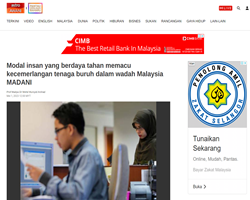This study makes an original contribution by showing that the process of career development as a social entrepreneur has given meaning to the informants. Despite presenting many challenges, social entrepreneurship has reinforced the role of youth social entrepreneurs, especially in relation to social responsibility.
Citation
Che Nawi, N.R., Arshad, M.M., Krauss, S.E. and Ismail, I.A. (2022), "Challenges faced by youth social entrepreneurs in Malaysia: career transition to become a social entrepreneur", European Journal of Training and Development, Vol. 46 No. 3/4, pp. 317-336. https://doi.org/10.1108/EJTD-02-2020-0021
Publisher
:
Emerald Publishing Limited
Copyright © 2021, Emerald Publishing Limited
1. Introduction
A career as a social entrepreneur has a positive outlook for involving youth in Malaysia. Even though social entrepreneurship activity is still in its early stages (Farok, 2011; Malaysian Global Innovation and Creativity, 2015, 2016; Othman and Abd. Wahid, 2014; Sarif et al., 2013), participation by youth in social entrepreneurship activities in Malaysia is quite encouraging, with 64% of those engaging in such activities being youth under 40 years of age. Youth of age 21–30 years have the highest involvement in social entrepreneurship activities, making up of 37% of all social entrepreneurs (Malaysian Global Innovation and Creativity, 2016). By comparison, most social entrepreneurs in other countries, such as the UK, are of age 44–65 years (Villeneuve-Smith and Chung, 2013).
Social entrepreneurs have two roles. First, they conduct social entrepreneurship activities that are intended to overcome social problems, and second, they use a business to provide these activities, and this business organisation is known as a social enterprise (Che Nawi, 2018).
An individual passionate about entrepreneurship may embark on a career in it because of the experience and knowledge gained in their previous career (Burton et al., 2016; Eesley and Roberts, 2012; Midlane, 2010; Unger et al., 2011). His or her career as an entrepreneur has been described as a new career opportunity (Inkson et al., 2010), and the decision to become an entrepreneur can be seen as a career option (Mohamad et al., 2014; Pittino et al., 2020). A career in entrepreneurship involves an individual deciding to start their own business (Schreuder et al., 2007). The main reason for an individual deciding to become an entrepreneur relates to their intention (Fayolle et al., 2014; Krueger, 2017; Renko et al., 2009; Shaver, 2012) to overcome social problems.
Careers today do not focus solely on promotion within a hierarchical organisation. With the emergence of the postmodern career within organisations, there is greater career flexibility. For example, protean careers (Arthur and Rousseau, 2001; Holtschlag, et al., 2020; Peiperl and Baruch, 1997) are pursued by those who do not want to be tied to any organisational structure and who want to find meaning that can fulfil their life.
Entrepreneurial activity is a process of finding new opportunities in alternative careers (Lee and Venkataraman, 2006; Mohamad et al., 2014). Thus, social entrepreneurs act just like commercial entrepreneurs. What distinguishes them from the latter are their profit motive (Dees, 1998, 2001) and their greater focus on creating social value (Bacq and Janssen, 2011), whereby they generate or create mutual good (Murphy and Coombes, 2009; Narangajavana et al., 2016). Although social entrepreneurs act like commercial entrepreneurs, there is still a lack of research and discussion on the experience of youth involvement in social entrepreneurship as a career.
1.1 Study context and purpose
A career as a social entrepreneur has two significant roles: solving problems and empowering social enterprises. According to Malaysian Global Innovation and Creativity (2016), it is twice as difficult to develop a social enterprise, as it is to start a commercial business. This is because social entrepreneurs have the heavy responsibility of developing and sustaining the organisation while also creating social value and having an impact on economic development.
This study focuses on how youth develop their careers as social entrepreneurs, as there is still a lack of research on youth involvement. According to the British Council (2018), the common challenges facing social entrepreneurs in Malaysia are cash flow (55%), lack of awareness of social enterprises in Malaysia (36%), recruiting staff or volunteers (33%), obtaining other forms of financing (31%), obtaining grants (27%), availability of suitable premises or workspace (22%), lack of access to business support and advice (21%), government regulations and administrative burdens (19%) and shortage of business skills (17%). The findings of this report indicate the challenges for social entrepreneurs relating to running and managing a social enterprise. However, there has been no study on careers among social entrepreneurs.
In Malaysia, youth are regarded as those aged 15–30 years effective on 2018 (Malaysia Youth Policy, 2015). Although social entrepreneurship is generally viewed as a high-risk career, it has become a career of choice among Malaysian youth (Malaysian Global Innovation and Creativity, 2015). This paper explores the experience of social entrepreneurship among youth in the Klang Valley area, encompassing the Kuala Lumpur, Selangor and Putrajaya regions, which are the main economic region in Malaysia. Most social entrepreneurs start up their social enterprises in the Klang Valley area (British Council, 2018) because stakeholders and funding can be found there. This is an important aspect as, according to a report by Malaysian Global Innovation and Creativity (2016), social entrepreneurs in Malaysia face the problem of balancing the two main roles of sustaining their business and creating social impact without any prior business knowledge.
Therefore, the purpose of this study is to explore the challenges faced by youth social entrepreneurs who run social enterprises in Malaysia. It aims to provide empirical evidence in the field of human resource development (HRD) as well as in relation to Malaysian social entrepreneurship activities.
1.2 Significance of study
A study of the experience of youth involvement in social entrepreneurship careers in Malaysia has significant value in that it can provide a more in-depth understanding of such careers. As there are few studies on careers as social entrepreneurs, the results from this study can contribute to a new body of knowledge within the fields of HRD and career development.
In relation to Malaysia, studies on social entrepreneurship activities have focussed on economic development (Li, 2010), survival (Ismail and Sarwar, 2013), social entrepreneurship potential (Radin Siti Aisyah et al., 2013), social entrepreneurship for Higher Education Institutions students (Hariyaty, 2014) and poverty eradication (Zainol et al., 2014). More general studies that do not focus on Malaysia include that by UNICEF (2007) on social entrepreneurs among youth and by Tina (2015) on youth social entrepreneurship and positive youth development. Ashour (2016) considered social entrepreneurship as a career of choice for university students in the United Arab Emirates. Therefore, there is a need for a study that focuses on the process by which youth shape and develop their careers as social entrepreneurs in the Malaysian context and this study may contribute worldwide.
1.3 Contribution to human resource development
There are a few studies relating to social entrepreneurship and HRD. Wang (2012) introduced the concept of social entrepreneurship into HRD to explore how social entrepreneurs address social or environmental problems by focussing on organisational development principles. Wang (2012) also called for good cooperation between HRD practitioners and social entrepreneurs so that the latter could succeed in their mission of giving back to the community and nation.
According to the Commission Expert Group on Social Entrepreneurship (2016), some social enterprises (i.e. organisations that conduct social entrepreneurial activities) have helped to solve unemployment issues by creating new job opportunities for youth. Although the aims of social entrepreneurship are to achieve high profits, some social enterprises nevertheless provide job opportunities that are more stable and secure in term of jobs for youth (United Nations, 2020). Stošić-Mihajlović and Nikolić (2017) found that social enterprises have employment policies that offer job opportunities exclusively to vulnerable groups. For example, some social enterprises offer work and a chance to develop skills to youth who have no prior work experience and face difficulties in securing a stable job.
This indicates that social entrepreneurship has contributed to HRD by developing the skills of youth employees as part of their career development. According to McLagan (1989, p. 53), career development is to focus on assuring an alignment of individual career planning and organisational career management processes to achieve an optional match of individual and organisation needs. Career development primary emphasis is on the person as an individual who performs and shapes his or her various work roles. Its major intervention is the influence on self-knowledge and on processes that affect individual and organisation abilities to create optional matches of people and work.
Therefore, the present study can contribute to the HRD field as well as to the area of social entrepreneurship through its exploration of youth who have transition to social entrepreneurship from a previous career.
1.4 Implications for human resource development
The findings of this study will provide much valuable information for HRD practitioners, youth social entrepreneurs, policymakers, and stakeholder (especially for sectors that develop and promote social entrepreneurship in Malaysia, such as MaGIC, myHarapan and the British Council and also worldwide). This paper aims to explore the challenge of career development for youth social entrepreneurs. There may be implications for HRD regarding career development among youth who transition from a previous career to social entrepreneurship.
Moreover, social entrepreneurship and HRD share similar core values and missions (Wang, 2012). As discussed above, social entrepreneurs aim to create social value and give back to the community and nation. The target group of the value proposition are the disadvantaged population (Martin and Osberg, 2007). This value proposition is similar to the definition of HRD as any process or activity that, either initially or over the longer-term, develops adults and their work-based knowledge, expertise, productivity and satisfaction. Such development can be for personal or group/team gain, or the benefit at the level of an organisation, community, nation or, ultimately, the whole humanity. (McLean and McLean, 2001, p. 4).











 full article
full article 

















